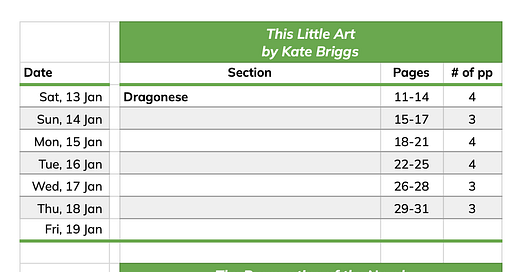The #KateBriggs24 reading project begins this Saturday, January 13th! Kim and I are so excited to read the works of Kate Briggs along with all of you. I read This Little Art back in 2021, and it changed my way of thinking about translation, plus kicked off an obsession with translated books — and with Kate Briggs — that has been with me ever since. I have not read Roland Barthes’s The Preparation of the Novel, and I’ll admit that it intimidates me. I don’t know what I’m in for with this book. I welcome your insights.
I love Lydia Davis’s blurb on the back cover of This Little Art where she says that it “shares some wonderful qualities with Barthes’s own work — the wit, thoughtfulness, invitation to converse, and especially the attention to the ordinary and everyday in the context of meticulously examined theoretical and scholarly questions.” If Lydia Davis is right about this — and of course she is — I will soon become obsessed with Barthes as well. I can’t wait.
Schedule
We begin with the first sections of This Little Art and The Preparation of the Novel. Below is the reading schedule for the upcoming week. As always feel free to follow this schedule exactly or modify it to suit your free time and reading habits. You are welcome to fall behind and catch up later, to get overexcited and read ahead, to drop in and out at random, to read only one of the two books under discussion — whatever you want.
Resources
As we read, I’d like to point you to relevant supplemental readings and resources that you might find useful. If you come across others you’d like to share, please do.
On p. 26 of This Little Art, Kate references an interview Melinda Harvey conducted with Elena Ferrante’s English translator, Ann Goldstein: “Ann Goldstein on Translating Elena Ferrante and the Inner Workings of The New Yorker.”
Kim will be adding materials about Kate Briggs and her books to her website as we go through the year, so make sure to bookmark it. Right now, you will find an introduction to the ideas behind this project, links to the main texts, and our full reading schedule. Plus Kim runs two other great reading groups and documents her reading and film-watching on the site, and you’ll want to see what she’s up to.
Discussion
Discuss the books wherever and however you like. On Twitter and Instagram, follow the hashtag #KateBriggs24 to see what people there are saying. On Bluesky, searching for “KateBriggs24” without the hashtag brings you to our discussion.
Or join in by clicking on the button below to leave a comment on the Substack website.
We can’t wait to hear your thoughts!
Rebecca and Kim
Find Kim on Twitter, Bluesky, and Instagram*
Find Rebecca on Twitter, Bluesky, and Instagram*
*Our Instragram accounts are locked, but we welcome bookish friend requests





Day 2 reading on Briggs:
Briggs’s introduction of Barthes (as translated by Richard Howard) into This Little Art introduces the idea of fantasy: “I sincerely believe that at the origin of teaching such as this we must always locate a fantasy, which can vary from year to year” (16). The context of this quotation is Barthes beginning a lecture series, and its placement in a section that comes right after the translation discussion sets up a connection between the fantasy involved in reading translation and the fantasy of the classroom and lecture hall: that the bodies of all those involved are contemporary. Barthes has learned his body is historical (he had the old form of tuberculosis), but he will pretend it’s contemporary with his students. We know The Magic Mountain is in German, but we will pretend everyone in it is speaking English.
I associate the word “fantasy” with fakery and illusion, but the fantasy here is very real: it’s based on a communal decision to work together. And, in a move that I love, Briggs is careful to bring the body into it (she follows Barthes in this): even though she was born after Barthes’s lecture was delivered, she is experiencing it and making it her contemporary through her physical experience of it.
Day 1 reading on Barthes:
As I read the Editor’s Preface by Nathalie Léger in Barthes’s The Preparation of the Novel, I was fascinated by this quotation from Barthes: “I’m not actually bothered about my chances of being fulfilled IN REAL TERMS (I don’t mind that they’re nonexistent). It’s just the will to fulfillment that blazes, that’s indestructible” (xxii). This is a quotation from A Lover’s Discourse, but in the context of the preface, it’s about the question of whether Barthes really wanted to write a novel or not. It’s tragic that Barthes’s death came so soon after The Preparation of the Novel, so we can never know whether the novel would have been written had he lived. But, as he says here, he’s not bothered about his chances of fulfillment. Instead, it’s all about desire. I agree that desire is the thing that matters, the space of joy and aliveness. That’s what I tell myself when I long for something to happen — it’s the longing that matters, not the thing happening — but I don’t really believe it. I tell myself that to make myself feel better. I suppose I know it to be true intellectually, but not in my bones. I feel that Barthes might know it in his bones, though. He seems like the kind of person who might dwell happily in the blaze of desire. What matters for him is the preparation, the planning, the book we have before us.